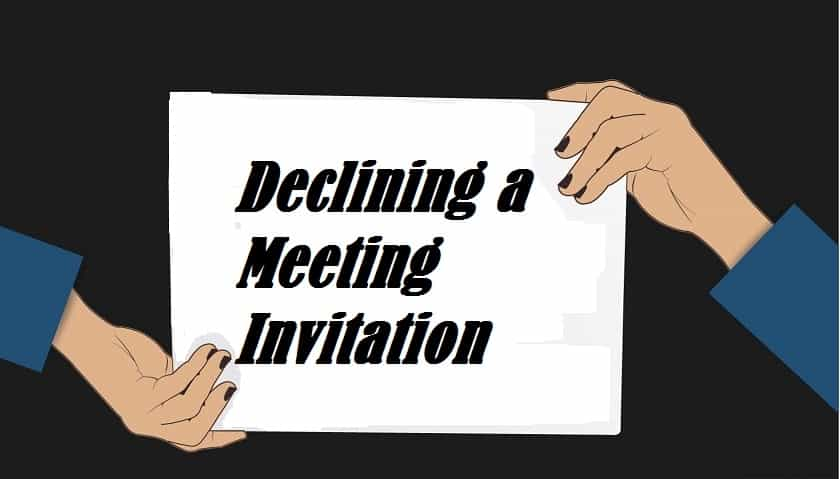If you observe a working day of an average American employee, you would realize that meetings waste a great deal of time. They account for the maximum unproductive time that an employee spends during their working hours, even more than the commute time, and the time consumed in paperwork, e-mails, phone calls and office gossips. Even in this age when workplaces are drastically evolving, there’s no escape from meetings. In such a complex situation, declining a meeting invitation can save a lot of time.

declining an office meeting invitation
But how do we do that? You might think that declining a meeting invitation might portray you as someone who is indifferent with company’s decisions and growth, right? Not if you are mature enough to decline the meeting request in a sensible and polite way. It will not only save your time, it will also spare you from all the planning that you may require to sound smarter at meetings. Like everyone, your priority would be to appear as the smartest person in the meeting room. Declining the meeting invitation will save you some more time that the duration of meeting itself.
Saying No To Office Meetings
You can just come up with a levelheaded reason for declining a meeting invitation and then you need to frame it with polite words. You have to show that you are really guilty of missing the meeting and will try to cover whatever you missed on that day. Here’s a sample:
Dear [NAME],
Thank-you for inviting me to the [NAME OF THE MEETING] on [DATE]. Indeed, I would love to come. However, due to [SOME SOLID REASON] (ex. I have other commitments that I need to address on that day). I am sorry, therefore, I won’t be able to attend the meeting. I would love to know what I missed if you can send a summary of the meeting to me over an email.
[STATE WHEN YOU NEXT EXPECT TO SEE THE RECIPIENT ex. I look forward, nonetheless, to our lunch meeting on 21st of this month.]
Best Regards,
[YOUR NAME]
However, you need to consider which meetings to decline and which ones to attend. You need to assess the value and agenda of any meeting before declining or accepting the invitation. Establish some criteria that need to be met to decide if the meeting is worth attending. Every meeting needs to have a clear agenda and should invite only required people to keep it short and on-track. Is the agenda that will be discussed in the meeting a priority right now? If not, you can simply postpone it. And if the meeting is not that important, you can simply cancel it altogether.
You need to make sure that you do that courteously so no one is offended or feel unimportant. Otherwise, it may lead to workplace conflicts and raise workplace issues, which may hinder the work environment and the overall culture of your workplace.
You Might Also Like:





